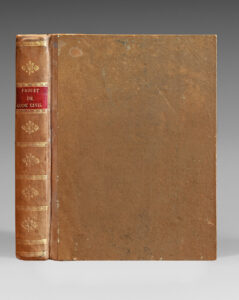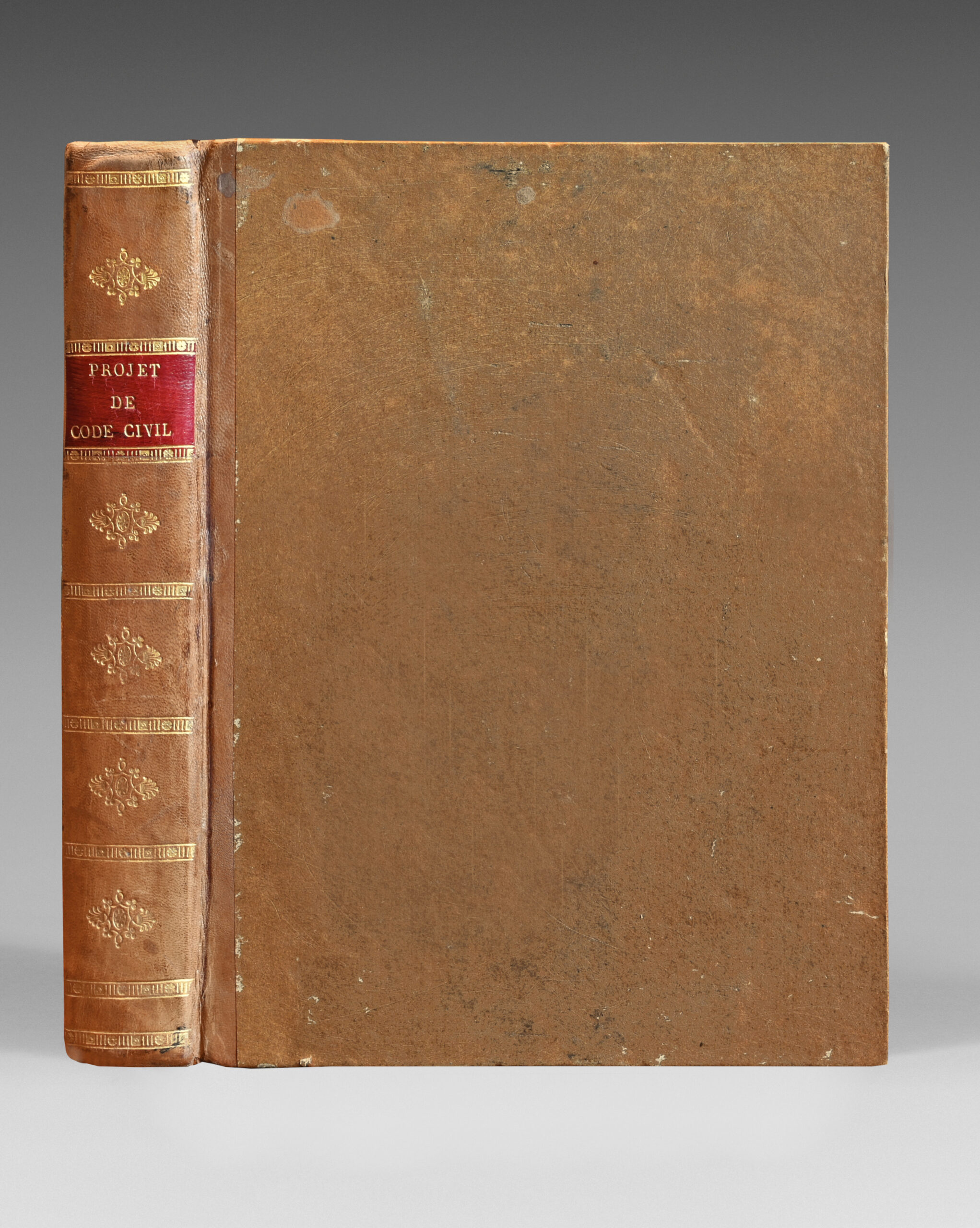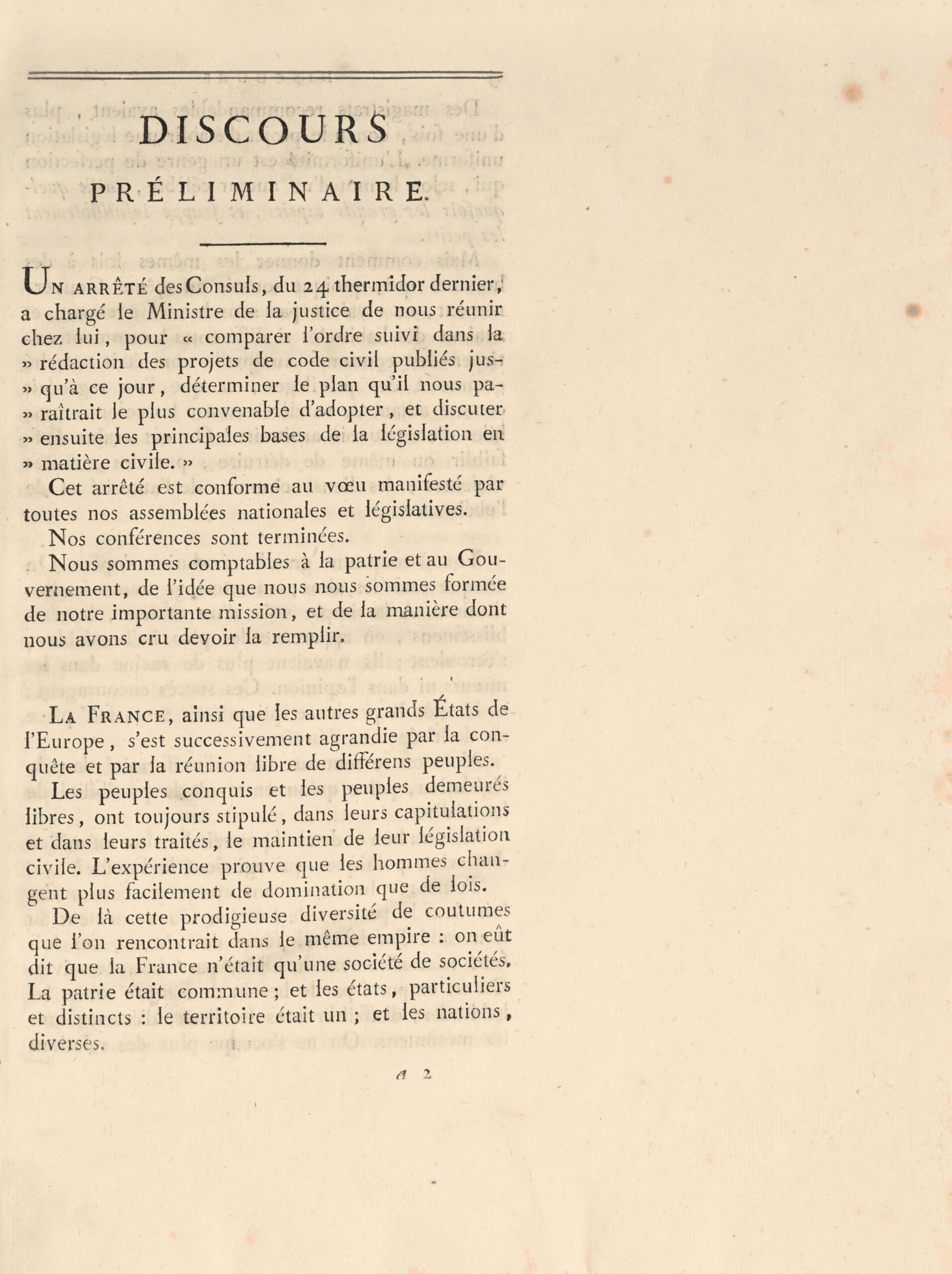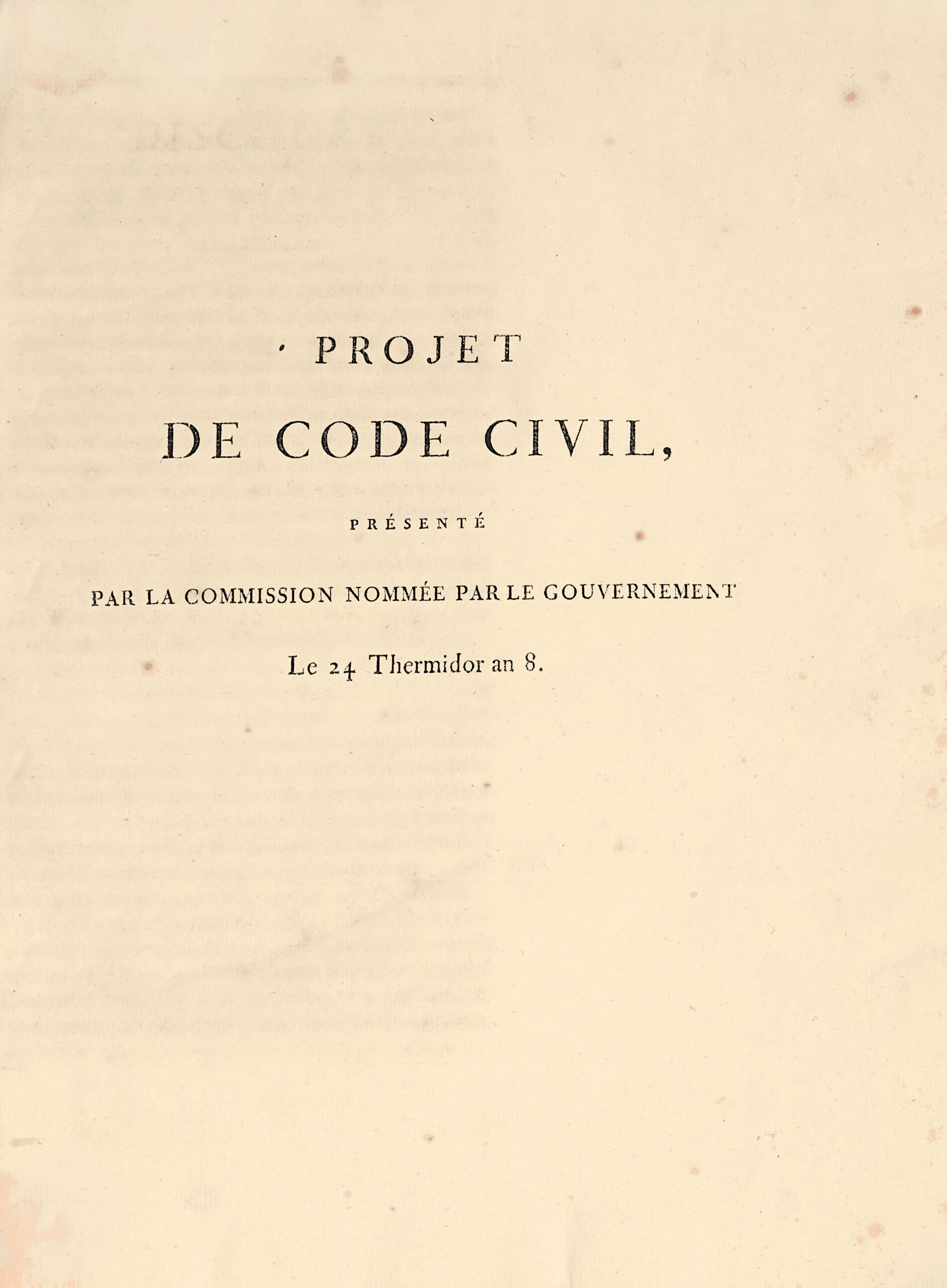Paris, Imprimerie de la République, Frimaire an IX (janvier 1801).
– [Followed by] : Projet de Code de procédure civile, présenté par la Commission nommée par le gouvernement.
Paris, Imprimerie de la République, An XII (1804).
Two works bound in 1 volume 4to, lxvi pp., (1) l. of table, 355 pp., (1) l., xii pp., 143 pp., small loss at lower corner of pp. 117 to 120 not touching the text. Half sheepskin, flat spine decorated with gilt fleurons, red morocco lettering-piece, yellow edges. Contemporary binding.
249 x 190 mm.
I/ Rare first edition which remained unknown to Monglond of this little-known project which preceded the publication of the Civil Code of the French by four yêrs.
It came into effect immediately following an ordinance issued by the Consuls (the first Consul Bonaparte) on 24 thermidor yêr 8 [12 August 1800].
The commission responsible for drafting it was made up of Portalis, Tronchet, Bigot, Prêmeneu and Maleville, who collectively wrote a 66-page preliminary speech before outlining the plan of the code.
This issue (4to with wide margins to contain the handwritten notes) was intended exclusively for the members of the constituted groups for the purpose of possible amendments.
Printing on a half-page column with a wide margin for rêding notes.
Several attempts had been made under the Old Régime and the Revolution to unify the body of civil law: the grêt royal summary ordinances, the projects of the Revolutionary Legislation Committee under Cambacérès (1793, 1794 and 1796). Napoleon Bonaparte deserves credit for having made this unification possible, through his will and his practical involvement: he set up a new legislation commission made up of members of the Conseil d’État – the jurists Bigot de Préameneu, Maleville, Portalis and Tronchet – and chaired half of their working sessions.
This commission finalized the present ‘project of the yêr VIII’, synthesis of the French traditions of the Roman law and the customs, then, after having subjected it to the court of Cassation and the courts of appêl, amended it consequently during discussions sometimes animated where the influence of Cambaceres was still felt.
The present Project of civil code thus presents technical and philosophical differences with the final text promulgated on March 21, 1804 like Civil Code, and still contains the preliminary book ‘Of the right and the laws’ which was then removed.
Following the coup d’état of 18 Brumaire, Bonaparte wiped the slate clên of the drafts of the Civil Code that had previously been drawn up, including the last of them, the Jacqueminot draft, which was never discussed. By a decree of 24 Thermidor An VIII, the Consuls, in application of the provisions of the Constitution of 22 Frimaire An VIII, which gave them the power to initiate legislation (articles 25 and 44), decided to begin drafting a new project. To this end, they appointed a commission made up of Tronchet, President of the Court of Cassation, Portalis, Conseiller d’État, Government Commissioner to the Conseil des prises, Bigot-Préameneu, Government Commissioner to the Court of Cassation and Malleville, a member of the Court of Cassation. The commission’s mission was described in the decree appointing it as follows: ‘to compare the order in which the drafts of the Civil Code published to date have been drafted, to determine the most appropriate plan to adopt, and then to discuss the main bases of civil legislation’.
To this end, the commission drew up a draft Code, which it preceded with a ‘Preliminary Speech’ containing the discussion requested by the decree. It demonstrated its often-recalled zêl, as the work was completed within four months.
It was published in Frimaire an IX (January 1801) and the draft was then sent to the Court of Cassation and the Courts of Appêl for their comments. Here again, they were very diligent, since by Messidor (July) of the same yêr all the observations had been submitted. On 28 Messidor Bonaparte had the Conseil d’État decide how to proceed with the adoption of the Code: the draft would be divided into as many laws as there were subjects to be examined, the preliminary provisions would be included in a single draft, and the commission that had prepared the draft would be responsible for this division and for submitting êch of the draft laws thus prepared to the Conseil d’État.
The text we are presenting here contains the draft code drawn up by the commission, preceded by the Preliminary Speech, co-signed by all its members, in the state in which it was sent to the Courts of Appêl and Cassation.
There are three different editions. An 8vo edition published by the Imprimerie de la République, intended for public information, and a version in the same format published by the printer Pauvelle, which are not common. The version we are presenting here is even much rarer. Although in 4to format, it is printed with the same typography as the 8vo, to free up half the page for annotations. This is therefore the edition that was intended for the courts, to enable them to present their observations.
The importance of this text is well known, as it contains significant differences with the draft that was finally adopted after discussion in the Conseil d’État. The ‘Preliminary Discourse’, for its part, is a rarely reproduced text (except in Fenet’s collection) and yet it deserves to be compared with that delivered by Portalis in 1804, before the final adoption of the Code (after êch of the drafts had been adopted separately, as it reflects a more liberal general philosophy).
II/ Extremely rare first edition of this draft code of civil procedure printed in Paris in the yêr xii (1804).
The Commissioners responsible for drawing up this Code were Treilhard, Try, Bertherêu, Seguier, Pigêu and Fondeur.
A precious reunion of two legal and historical texts of the grêtest importance and rarity.




